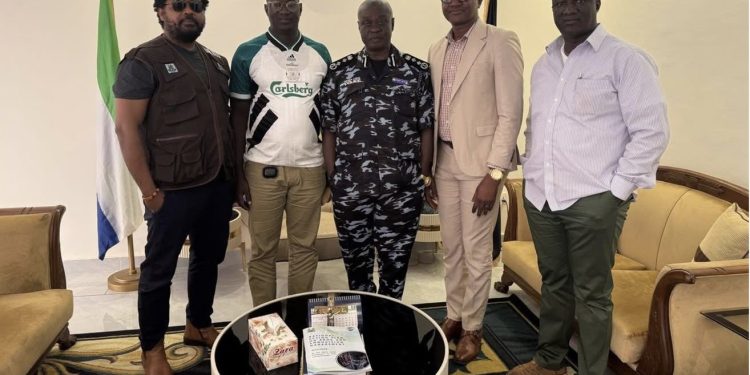By Mackie M. Jalloh
The Sierra Leone Association of Journalists (SLAJ) and the leadership of the Sierra Leone Police (SLP) have resolved a recent dispute involving journalist Thomas Dixon and Inspector General of Police (IG) William Fayia Sellu. The amicable resolution followed a meeting held at the Sierra Leone Police Headquarters on George Street, Freetown.
The meeting was convened to address tensions that had arisen after Dixon accused the IG of arrogance in a Facebook post, which led to concerns over Dixon’s safety and subsequent reports that he had gone into hiding with his family.
In attendance were SLAJ President Ahmed Sahid Nasralla, former SLAJ President Umaru Fofana, senior journalist and lecturer Dr. Isaac Massaquoi, and Dixon himself. Representing the police leadership was IG Fayia Sellu, whose participation underscored the importance of dialogue and resolution in maintaining harmony between the media and law enforcement.
The discussions began with a review of the incidents leading to the dispute. Dixon’s Facebook post, which referred to the IG as “arrogant,” had sparked widespread attention and raised concerns about possible retaliation or threats to his safety. Dixon and his family left their home amid fears of potential harm, prompting SLAJ to intervene and request a meeting with the police leadership.
During the deliberations, IG Fayia Sellu assured those present that at no point was there a threat to Dixon’s safety or security. He expressed his commitment to upholding the rights of journalists and emphasized the importance of mutual respect between the press and law enforcement.
The discussions culminated in a resolution that both parties found satisfactory. Dixon agreed to voluntarily delete his Facebook post, acknowledging the need to maintain professionalism in public discourse. The IG, in turn, reaffirmed his respect for the role of journalists in society and reassured SLAJ of his intention to foster a constructive relationship with the media.
“I want to assure SLAJ and the public that the safety and security of all citizens, including journalists, remain a priority for the Sierra Leone Police,” IG Sellu stated.
For his part, SLAJ President Ahmed Sahid Nasralla commended the police leadership for their willingness to engage in dialogue. He also emphasized the critical role of journalists in holding institutions accountable while maintaining ethical standards in their work.
“This meeting has demonstrated the value of open communication and mutual understanding. It is a reminder that disputes can be resolved through dialogue without compromising the principles of press freedom and respect for authority,” Nasralla said.
The resolution of this matter marks another step in SLAJ’s ongoing efforts to build a strong and collaborative relationship with the Sierra Leone Police and other national security institutions. Both parties pledged to work together to prevent similar misunderstandings in the future and to strengthen trust between the media and law enforcement.
Dr. Isaac Massaquoi, who also attended the meeting, highlighted the importance of such engagements in bridging gaps and fostering a culture of respect between journalists and authorities.
“This is a positive outcome that reaffirms the need for constructive engagement between the media and the police. It is our shared responsibility to ensure that freedom of expression is upheld while maintaining decorum in public interactions,” Massaquoi noted.
Following the meeting, Thomas Dixon returned home with his family, putting an end to the concerns over their safety. He expressed gratitude to SLAJ for their support and to the IG for addressing the matter with professionalism.
SLAJ reiterated its commitment to safeguarding the rights of journalists and ensuring a peaceful working relationship with the security apparatus. In a statement, Secretary-General Alhaji Manika Kamara reaffirmed the association’s dedication to promoting press freedom and collaboration for the betterment of Sierra Leone.
This resolution underscores the importance of dialogue in addressing conflicts and highlights the role of institutions like SLAJ in mediating disputes to protect freedom of expression and maintain societal harmony.










